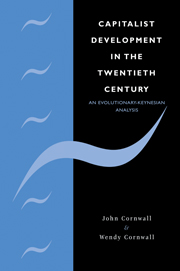Part III - Political control of the economy
Published online by Cambridge University Press: 22 September 2009
Summary
In part II, alternating episodes of poor and superior performance were traced to structural change endogenous to the performance of the economy, forming a causal chain linking successive episodes via negative feedback effects. The structural changes linking the episodes differed, with technology developments providing the link between the period of industrialization and the 1930s, and institutional developments constituting the links between the 1930s and the golden age and subsequently between the golden age and the existing age of high unemployment. Having made a point of the differences in linkages, we have no hesitation in stating that the failure to recover quickly once an adverse structural change has occurred is a failure of institutions to adapt to changing circumstances. As discussed in chapter 8, the depressed economic conditions extending over most of the 1930s could have been ended earlier with a Keynesian deficit spending programme, had there been the political will to introduce it. Although the cause of the Great Depression was technology, recovery was prevented by an institutional constraint on stimulative AD policy. In chapter 11 we argued that the golden age was brought to an end by the eventual incompatibility of full employment and acceptable rates of inflation. The institutional requirements for a full employment recovery today are more demanding than in the 1930s.
Our programme for recovery is implicit in the commentary running throughout our explanation of the structural influences responsible for alternating episodes of poor and superior performance.
- Type
- Chapter
- Information
- Capitalist Development in the Twentieth CenturyAn Evolutionary-Keynesian Analysis, pp. 241 - 243Publisher: Cambridge University PressPrint publication year: 2001

